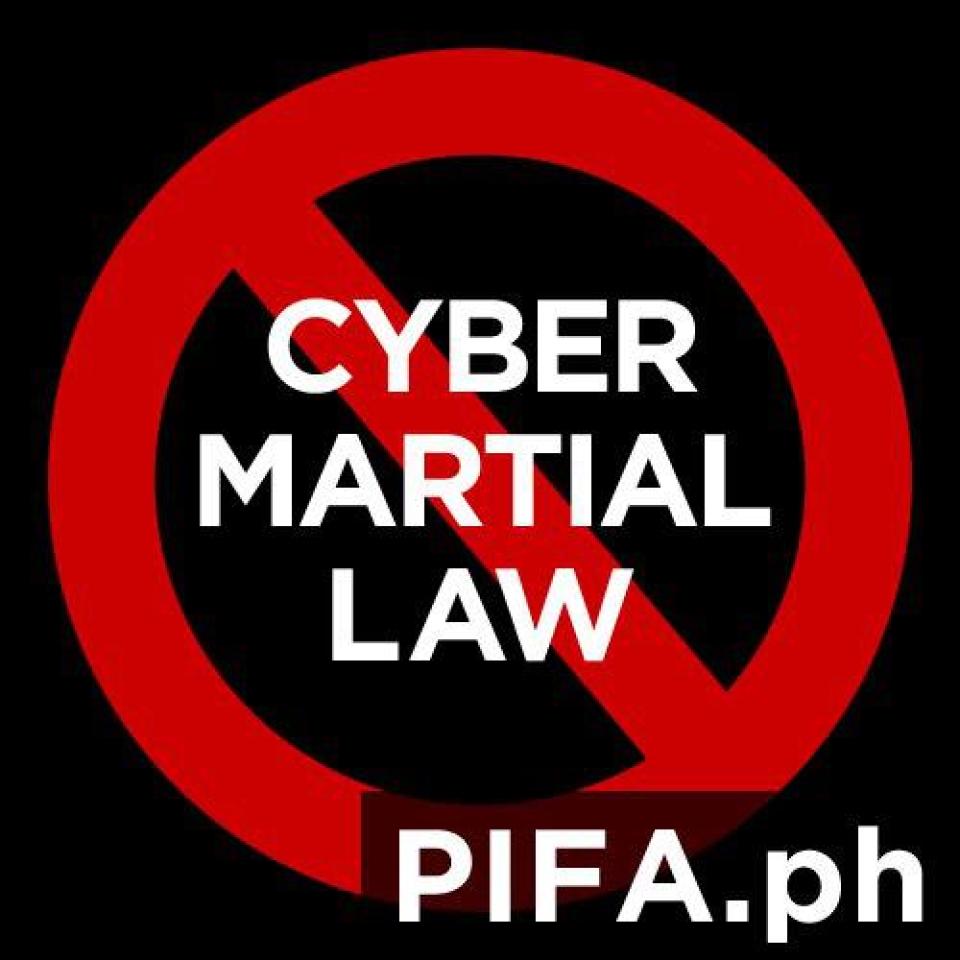
The recent passage of the Philippine Cybercrime Prevention Act of 2012 (or the Republic Act 10175) has elicited strong negative reactions from various stakeholders. Civil society organizations (CSOs), academe, journalists, bloggers, and Filipino netizens have expressed great concern over certain provisions of the law that impinged their constitutional right to freedom of expression. To date, there are ten petitions filed before the Supreme Court, seeking an order to restrain the implementation of the law and/or assailing the constitutionality of the law. This law is said to be the most opposed law in the history of the Philippines.
Foundation for Media Alternatives (FMA), one of the core group members of (the recently formed) Philippine Internet Freedom Alliance# (PIFA), has joined efforts in sending the message across all stakeholders that this law violates Privacy, Freedom of Expression, and Human Rights. Last Tuesday, Oct 2, PIFA held #BlackTuesday to protest what is dubbed as “Cyber Martial Law” for the law’s provisions curtail freedoms that should be protected by the Philippine Constitution. This protest was held offline and online. The offline protest was held at the Supreme Court to ask the courts to act on the petitions filed and issue a temporary restraining order (TRO) on the implementation of the law. Thousands of Filipino netizens participated both online and offline. The #NotoCybercrimeLaw protest even goes viral as the government continue to defend the correctness of R.A. 10175.
FTX on Cybercrime
As the struggle against the Cybercrime Prevention Law continues, several roundtable discussions and forums are being held, as capacity-building efforts to educate the people what this Cybercrime Prevention Law means, and how it would impact stakeholders’ lives/rights. FMA, in partnership with Women’s Legal and Human Rights Bureau (WLB), recently held a Feminist Technology Exchange on the Cybercrime Prevention Act of 2012 to strengthen advocacy on tech-related VAW, and to gain better understanding on the impacts of the law to women, and to craft urgent actions. The FTX, attended by 30 women leaders, specifically revolved around the “Cybersex” provision on Sec 4-c1, that can endanger women’s rights. This cybersex provision was included to content-related offenses under RA10175, under Chapter II Section 4, “Cybercrime Offenses”. The provision states:
Cybersex. — The willful engagement, maintenance, control, or operation, directly or indirectly, of any lascivious exhibition of sexual organs or sexual activity, with the aid of a computer system, for favor or consideration.
Elements of the crime is not well-defined, and too vague and overboard, that it poses harm to women. It also so endangers women’s sexual rights. WLB Executive Director Jelen Paclarin said “if the intent of the law is to suppress the business of cybersex, the measure may be futile as it fails to consider the transnational nature of cybersex where site owners or operators are beyond the jurisdiction of the Philippines. Often, women found in local cybersex dens are the ones arrested and put behind bars.”
Injecting Feminist Lens to the discourse
Since there are many contentious provisions on the law, FMA tried to re-assess its possible contributions to the discourse, and identified the lack of reiteration of women’s rights. Most of the questions raised on the law focused on cyber-libel and freedom of speech, and only a few considered the cybersex provision problematic as well.
The Take Back The Tech Philippines network, convened by FMA, that has been working to address technology-related VAW can lead in making the public (and the Government) understand the very nature of ICT, not just a platform for VAW, but as a tool for empowerment. We should reiterate that careful analysis of technology-related VAW cases is in order to make sure that government mechanisms will be effective in upholding women’s rights. R.A. 10175 is blind to the real state of ICT-related VAW and must be questioned.
The Take Back The Tech Philippines network also see a good opportunity to advocate internet rights as framework for the movement pushing for internet freedom. The recently formed PIFA has been active in campaigning questionable provisions on RA10175, with internet freedom as its banner call. Though PIFA is just new, it has gained momentum in the campaign to oppose the Cybercrime law. A lot of organized groups have also expressed intent in joining/supporting PIFA and we see that has a great potential to be in the forefront of internet rights advocacy in the Philippines.
- 16655 views






Add new comment